Tariffs: Another American act of intentional self-harm


As Adam Smith said, "there is a great deal of ruin in a nation."

This should anger all our MAGAs. It should also anger all our libs.
Must be worthwhile...

My high school history teacher was a colorful character. I still remember one time when I asked him why some historical actor had done something stupid. He grinned asked me: “Why does a dog lick its balls?” When I couldn’t come up with a good answer, he waggled his eyebrows and said: “Because it can .”
That wasn’t a particularly satisfying answer. But in the 21st century, it often seems like America does stupid things just because it can . Why did we go to war in Iraq? Why did so many of us refuse to take Covid vaccines? Why did we let West Coast cities slip into anarchy? Why did we fail to punish Trump’s attempt to overturn the election of 2020? And so on, and so forth. It seems like we got bored of all the smart, successful things we did in the 20th century, and started exploring all the possible ways we could be stupid instead.
It’s not as if these mistakes aren’t having negative consequences. They are! The Iraq war was a costly debacle, the antivax movement cost many thousands of lives, lax policing probably killed thousands, and so on. We keep touching various hot stoves, jerking our hands away, and saying “Ouch! Well maybe this other hot stove will be good to touch.”
Today America put its hand on yet another hot stove, when Trump announced a series of enormous new tariffs on almost every country in the world. Here’s at least a partial list :
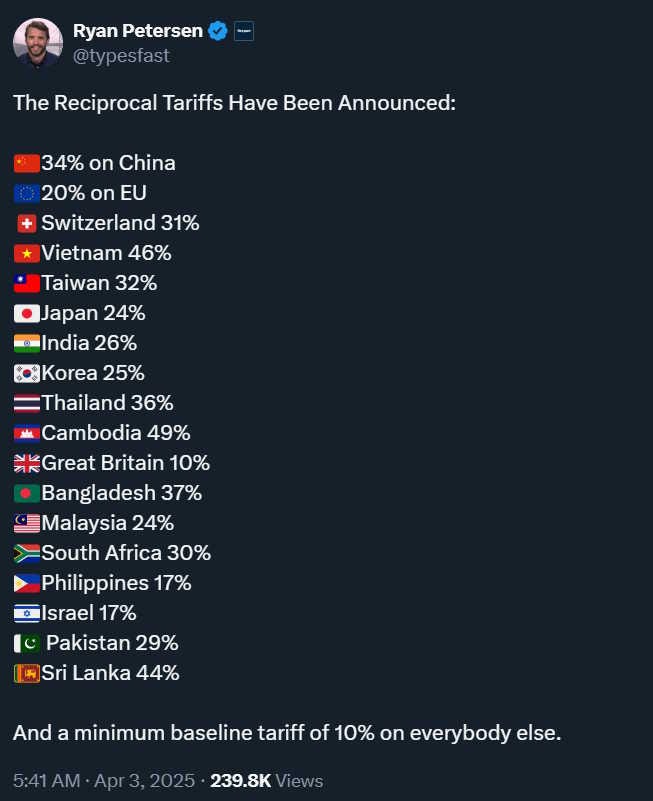
The only two countries on the planet that were exempted from Trump’s tariffs were Russia and North Korea . (Note that I still don’t think Trump is actively working for the Russians, but he’s not doing a heck of a lot to prove me wrong on that count.)
Historically speaking, these tariffs are absolutely enormous. They are much higher than the famous Smoot-Hawley tariffs imposed at the start of the Great Depression:
And in case you think it’s just one Mad King doing this, realize that Congress has the power to revoke Trump’s tariff authority and cancel all of these tariffs any time it wants. The fact that it has not done so means that a critical mass of our elected legislature is on board with Trump’s program.
It’s almost tragicomic to watch Trump’s apparatchiks scramble to defend this act of intentional economic self-harm. For example, Peter Navarro, who is now probably Trump’s key economic advisor, tried to tell us that tariffs are actually tax cuts :
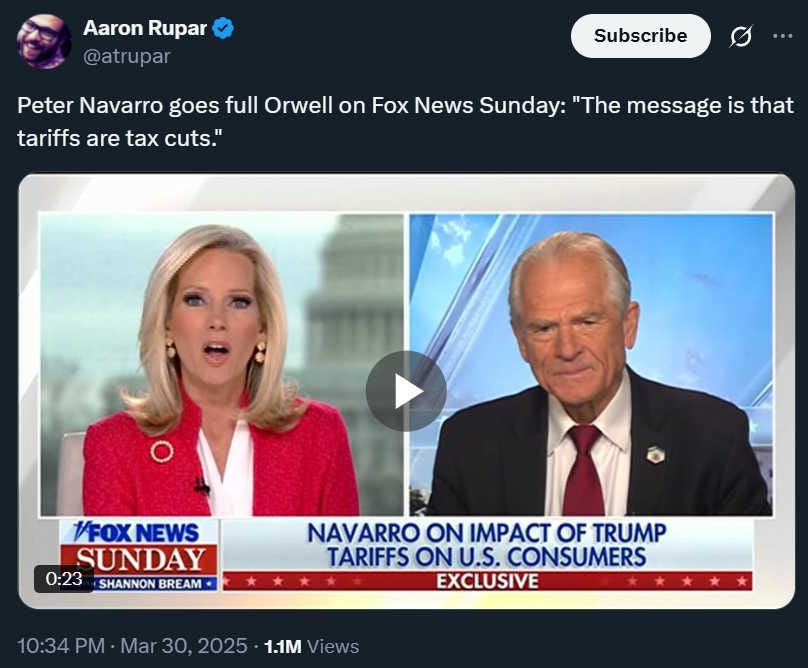
Well, no they’re not. That’s just wrong. “Tariff” means “import tax”. In fact, the only way tariffs could ever actually shift production to America from overseas is by raising the prices of imported goods. I’m not sure whether Navarro means that tariffs will allow us to cut other kinds of taxes (which would only be true if we want to run up the national debt even more than we’ve been doing), or whether he’s just mouthing the words “tax cuts” robotically because that’s what Republican voters have been conditioned to like. But either way, it’s a farce.
Other defenses of tariffs are even less coherent — just blizzards of meaningless buzzwords. And some Trump officials have even resorted to telling Americans to suck it up and accept lower standards of living — Treasury Secretary Bessent has declared that “Access to cheap goods is not the essence of the American dream.” (This would come as news to many Americans.)
Meanwhile, some Trump supporters are clinging to the hope that these tariffs are just a bargaining tactic that Trump will use to force other countries to lower their own trade barriers against American goods. That’s incredibly unlikely, given that A) all the evidence shows Trump just likes tariffs and hates international trade, and B) the tariff rates that Trump claims other countries are charging the U.S. are entirely made up.
( Update : After much confusion, Trump’s people released the formula that they used to calculate the made-up “tariff” rates that they attributed to other countries. I put a detailed explanation at the end of this post.)
Americans will not be fooled by any of this. Stock markets had already declined in anticipation of Trump’s new round of tariffs, but the import taxes are apparently much bigger and more aggressive than investors had been expecting, so markets are set to fall even more . Trump’s poll numbers are falling , as swing voters recoil from the hot stove.
And yet, like Maoists during the Great Leap Forward, Trump’s apparatchiks are calling for Americans to forsake material prosperity and line up behind their President’s ideological program :
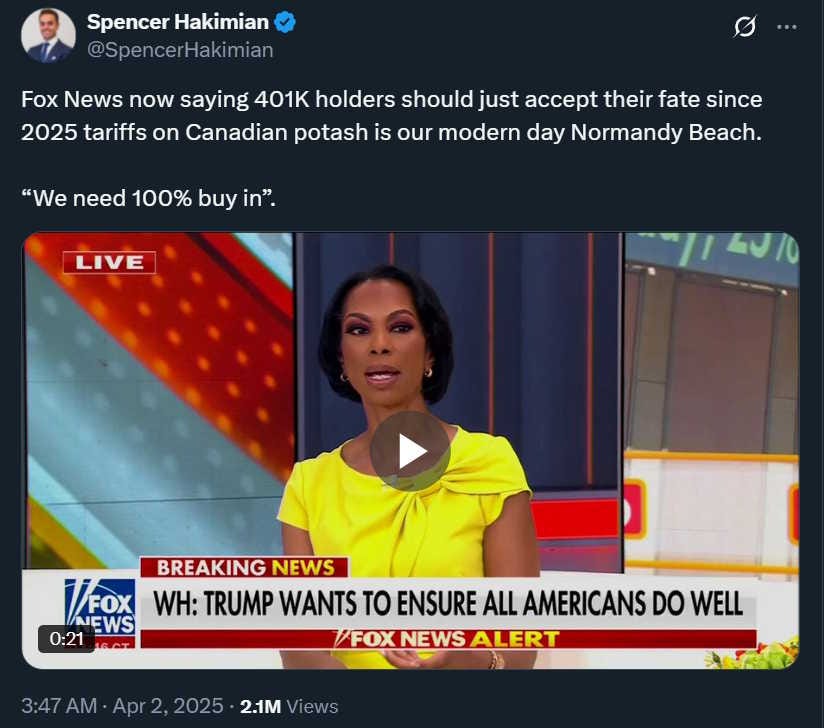
The basic message is “Let them eat ideology.” Trump called these tariffs “Liberation Day” because his ideology says that trade with other countries makes the U.S. dependent on those countries. To Trump, economic isolation is freedom, and that freedom is worth more than your 401(k).
Why is America choosing this moment to embrace an insane, self-destructive economic ideology? One reason is that the many years in which Trump’s subordinates managed to restrain his worst impulses simply tricked much of the country into believing they could take Trump “seriously but not literally”, and that he would never actually smash the economy. Another reason is that America is just emerging from a period of popular unrest, in which crazy ideologies of all stripes got far more buy-in than they should have.
But there’s also a deeper, longer-term reason. Over the past two decades, Americans collectively convinced themselves that their economy — by many measures one of the top performers in the world, and indeed in all of human history — was fundamentally broken and needed major changes. This line of thinking, popular on both the right and the left, did succeed in identifying some problems with the existing American system. But it massively blew those problems out of proportion, and brought way too much ideology into the debate. Now we’re going to experience the consequences.
This is where "anti-neoliberalism" got us
The United States is among the world’s very richest economies, and the richest large economy. Yes, this is true in terms of median income, after accounting for taxes, government transfer payments, and differences in prices between countries:
(And yes it’s also true if you add in the value of services that the government provides directly to citizens.) And in terms of consumption per capita , it’s way ahead of everyone else.
For whatever reason, some Americans — especially the minority who’s very engaged in politics — was still very unhappy with this state of affairs. Exactly why this was true is a topic for a much longer post, but there are many theories. One is that people measure their success in relative terms, and America’s greater inequality led to various class resentments. Another is that mostly-non-economic factors that reduce quality of life in America — high crime in particular, but also obesity, poor urban planning, etc. — made people feel a sense of dissatisfaction that they blamed on the economy. A third is that people simply get used to a high standard of living and become restless and dissatisfied no matter how rich they are. A fourth is that various idiosyncratic uninsurable risks — the risk of medical bankruptcy, the risk of unemployment, etc. — made Americans feel poorer than they were. And so on.
Whatever it was, discontent with the world-beating American economic system began to bubble up in the 1990s, when the Seattle WTO protests showcased a bunch of concerns about globalization — in particular, the notion that free trade would lead to a “race to the bottom” in terms of labor and environmental protections. Those concerns were justified . In fact, they were more than justified, as China’s industrialization in the following decade hollowed out American manufacturing and destroyed the careers of many U.S. factory workers.
In any case, discontent only mushroomed following the financial crisis of 2008 and the long, deep recession that followed. Occupy Wall Street was an inchoate explosion of rage at the finance industry and capitalism in general, but over the next decade it crystallized into the modern socialist movement and the Bernie Sanders campaign.
The socialists had a name for what they didn’t like: “neoliberalism”. You started to see a torrent of op-eds and blog posts like this :
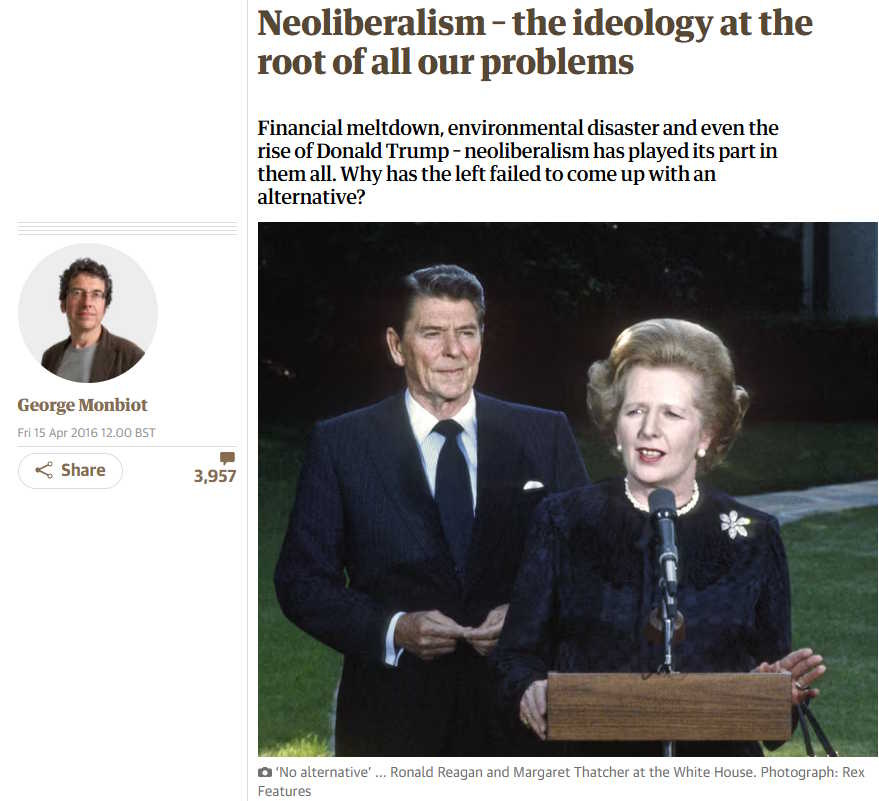
The new socialist movement embraced a basic story that labor-lefties had been telling for decades — that the right-wing governments of Ronald Reagan, Margaret Thatcher, and various others had used laissez-faire policies like free trade, low taxes, privatization, and cuts in the welfare state to loot previously healthy capitalist societies, allowing a small number of malefactors to run away with the vast majority of the fruits of workers’ labors.
This story had a little bit of truth to it, but was always full of holes. For one thing, Reagan and Clinton together managed to implement only a modest amount of actually neoliberal policy change in the U.S. There was also tons of mythmaking about how bad the U.S. economy in particular had gotten for regular workers. For example, the famous chart claiming to show a huge divergence between workers’ wages and productivity turned out to be almost entirely due to two data tricks — A) the use of different inflation measures for wages than for productivity, and B) the difference between mean and median:
The popular myth that wages for regular American workers are lower than in 1973 is also now about 30 years out of date:
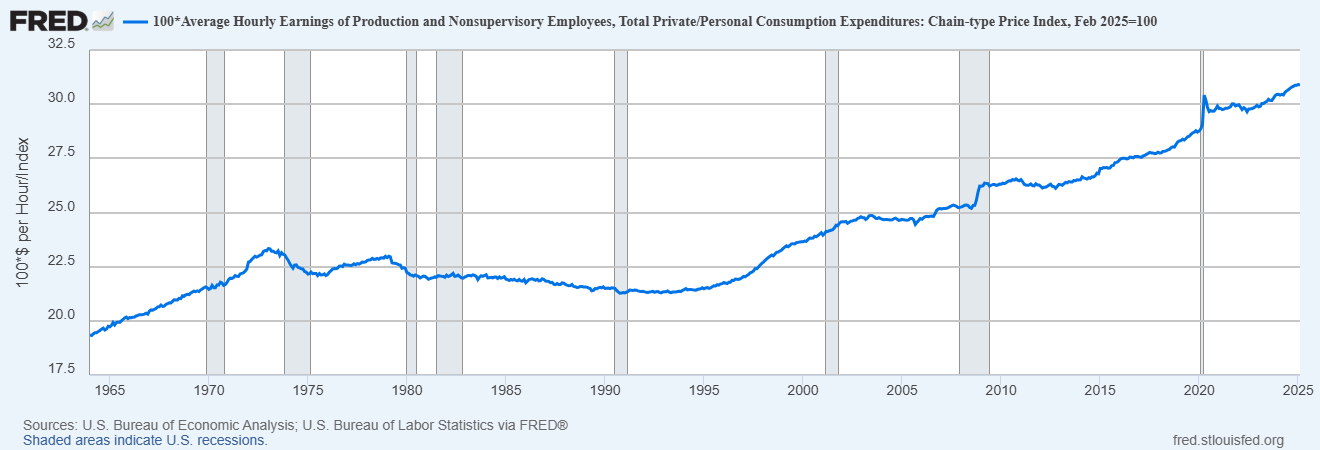
The popular French economists who are behind most of the eye-popping inequality statistics may also have exaggerated their numbers; inequality has risen, but not as much as they claim .
The truth is that there were major problems with the economic policies championed by small-government conservatives and laissez-faire economists in the 70s, 80s, and 90s. The displacement of rich-world factory workers — the proverbial “losers” from free trade — was real. The environment really was despoiled by reckless Chinese growth. Inequality really did increase somewhat, as did the economic risks borne by the average American. Wage competition from China and other developing nations probably did help weaken the bargaining power of organized labor. And perhaps most importantly — though the labor-lefties and socialists didn’t really care about this — the migration of so much manufacturing to China hollowed out democracies’ defense-industrial base, and weakened the free world severely in the face of a rising authoritarian axis.
But the idea that “neoliberalism” had failed to deliver the common people of America and the West in general was always largely a myth. Nevertheless, it became ever more popular, and eventually it was taken up by two other groups who had the ability to do more than march in the streets and get snarky on social media: Warrenite progressives and MAGA rightists.
The Warrenites — wonkier and less popular than the Bernie socialists, but more influential in the Biden administration — blamed corporations and the “tech bro” class for the perceived ills of American life, and recommended stronger antitrust and controls over technological innovation as the solution. Almost no one cared about either of these things; antitrust made a little progress, while Luddism took hold only in Europe if at all. But the general attitude that the ills of “neoliberalism” could be solved by finding the right class of Americans to disempower prevented the Warrenites — and by extension, much of the Biden administration — from addressing the declines in state capacity and the entrenchment of degrowth policies that have actually prevented Americans from enjoying more abundance than they do.
But it was the MAGA movement that finally actually put anti-neoliberalism into practice. MAGA hates neoliberalism for two basic reasons. First, many rightists believe that the pursuit of economic prosperity has been detrimental to their view of what the American nation ought to be. Immigration, especially of the skilled variety, raises living standards for native-born Americans, but to many rightists this trade-off isn’t worth it. Some also believe that the pursuit of ever-higher GDP has caused Western governments to lose their sense of solidarity with the white working class.
Trump and his people, though, have a different reason for hating neoliberalism — or at least, the free trade part of neoliberalism. They believe it has weakened America by allowing other countries to rip the U.S. off. Peter Navarro, who appears to be the only economic advisor Trump listens to anymore (possibly because he remained absolutely loyal to Trump during the coup attempt of 2020), believes that trade deficits reduce U.S. GDP . Trump appears to think this as well, and thus assumes that any country with whom the U.S. runs a trade deficit is making us poorer by doing so.
Trump and Navarro are wrong, and the fairly large number of Americans who also believe that trade deficits reduce GDP are wrong. The error partly stems from a basic misunderstanding of how imports are counted in GDP. Many people think imports subtract from GDP, but in fact they aren’t counted at all:
Once again: Imports do not subtract from GDP
Fundamentally, Trump and Navarro are focusing on net exports — the trade deficit — instead of total (gross) exports. They want to cut off America’s economy from the world because they’re angry about the red line in the graph below, while totally ignoring the importance of the much bigger green line:
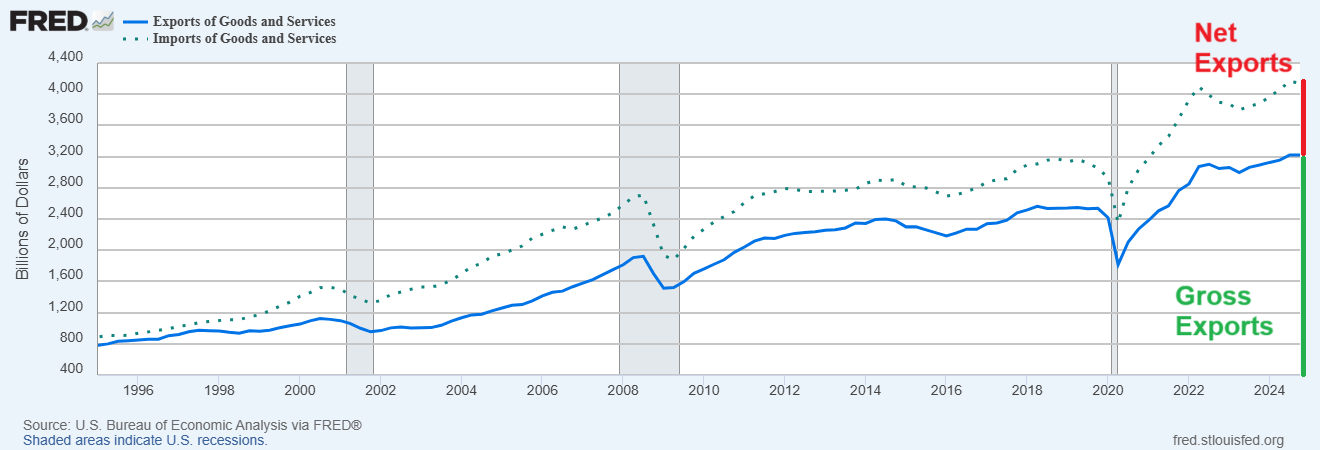
For Navarro, this is a matter of bad economics. For Trump, it’s a matter of ideology — he sees America as only being truly independent and free if it has no economic dependance on other nations. As JD Vance puts it , “President Trump believes in borders. He believes in economic self-sufficiency. He believes America should be a great nation.”
It’s an American version of North Korea’s ideology of juche . And just like the hapless North Koreans, regular Americans are now going to suffer economically so Trump can pursue this mad ideological crusade.
This is actually existing anti-neoliberalism . Whatever the faults of the laissez-faire approach crafted by Reagan, Clinton, et al., they pale in comparison to the disaster that will result from the electorally viable part of the backlash to that approach. I’ve spent much of my career as a pundit arguing that neoliberalism needed deep reforms and the addition of industrial policy . Now I’m being forced to face the fact the reforms I wanted lost at the polls — and the only anti-neoliberal policy that succeeded at the polls was one that will make Americans poorer while making their nation weaker at the same time.
Trump’s tariffs will deindustrialize America even more
Why will Americans suffer economically from tariffs? It’s important to emphasize that the harm won’t just be to American consumers who are cut off from cheap foreign goods, or to American savers whose 401(k)s and pensions get hurt by falling stock prices (though both of these groups will certainly be harmed for no good reason). Tariffs will also harm American manufacturing.
When Trump and Navarro and the MAGA movement say that trade deficits make America poorer, it’s not only because of the simple accounting mistake that I talked about in the previous section. They also believe that they think that imports crowd out U.S. production. They think consumption is very inelastic and domestic production is very elastic, and so if we block one European car from being sold in America, it will mean America produces one more car here at home.
In fact, some of that does happen, and tariffs will cause some new investments in the U.S. economy, as companies scramble to avoid the tariffs. Apple, for example, is already planning some increased investments in the U.S. Trump & co. will undoubtedly point to these successes.
But when we look at the overall response of American manufacturing to these tariffs, it’s overwhelmingly negative. The Institute for Supply Management has some surveys of U.S. manufacturers, and it’s very grim:
There may be scattered new investments, but overall, American manufacturing activity is shrinking:
And when ISM asked manufacturers why they plan to shrink their operations in America, the answer was just “tariffs”:
Even steel manufacturers — one of the main industries that Trump has vowed to protect from foreign competition — are now laying off workers because Trump’s import taxes are cutting them off from raw materials. In fact, it calls into question whether “protectionism” is really even the right term for Trump’s economic ideology — “isolationism” is almost certainly a better term, because almost no one is actually being protected here.
The fundamental problem — which Trump and his advisors refuse to understand — is that import substitution is far from the only way that tariffs affect domestic manufacturing. I explained the other mechanisms in this earlier post:
There is no utopia waiting on the other side of Trump's economy
-
Cutting off imports disrupts supply chains, forcing American manufacturers to use scarce resources on lower-value parts of the value chain.
-
Cutting off America from export markets reduces the economies of scale available to U.S. manufacturers, raising their costs and reducing their productivity.
Right now, most of the negative effects of tariffs on U.S. manufacturing will be due to the first of these, since supply chain disruption happens very quickly. But the fact that the stocks of U.S. manufacturers are also falling suggests that investors expect the longer-term effect of (2) to kick in eventually as well.
Research strongly agrees that this will be the eventual result. Although there are cases where targeted tariffs can be effective at preserving strategic industries or growing infant industries, the overall pattern is that countries that raise tariffs become poorer . 1
In other words, there’s no long-term gain in exchange for short-term pain here — it’s just pain now and more pain later.
America’s abrupt turn toward economic isolationism isn’t quite as insane as Mao Zedong’s Great Leap Forward, or many of the programs of economic isolationism undertaken by Cuba, North Korea, and other communist countries in the 20th century. But it’s unmistakably cut from the same cloth. The American Right has taken some of the American Left’s worst ideas, and implemented them in their characteristically clumsy, haphazard way.
Unfortunately, almost all Americans — including most of the people who voted for Trump — are going to burn their hand on yet another hot stove. You’d think after so many of these self-inflicted mistakes, we’d be a bit more cautious, but no. As Adam Smith once said, “there is a great deal of ruin in a nation.”
Update : So, Trump’s tariffs are supposed to be “reciprocal” tariffs — the idea is to charge other countries the same tariff rates that they’re charging us. Most countries charge only very low tariffs on American goods. Except Trump apparently also believes that America’s bilateral trade deficits with other countries are entirely caused by some sort of sneaky secret trade barriers that we can’t see, but which are basically “tariffs” by another name. So his idea, basically, is to set tariffs on each country high enough to totally get rid of our trade deficit with that country.
So here’s the formula they used to figure out how high that rate would have to be:
Consider an environment in which the U.S. levies a tariff of rate τ_i on country i and ∆τ_i reflects the change in the tariff rate. Let ε<0 represent the elasticity of imports with respect to import prices, let φ>0 represent the passthrough from tariffs to import prices, let m_i>0 represent total imports from country i, and let x_i>0 represent total exports. Then the decrease in imports due to a change in tariffs equals ∆τ_i*ε*φ*m_i<0. Assuming that offsetting exchange rate and general equilibrium effects are small enough to be ignored, the reciprocal tariff that results in a bilateral trade balance of zero satisfies:
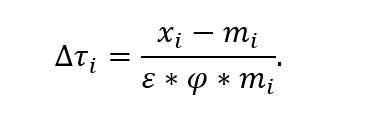
So basically, they assume that U.S. exports will be unaffected by the tariffs, and that all the tariffs will do is to reduce imports. They want to reduce imports by enough to exactly cancel out the trade deficit (x-m).
Next, they assume that the effect of tariffs on imports is linear. The change in imports due to the new tariffs will then be equal to the change in the tariff rate, multiplied by the amount that changes in tariffs result in changes in import prices (the “passthrough”), multiplied by the amount that changes in import prices cause Americans to buy fewer imports (the “elasticity of imports”), multiplied by the amount that America currently imports from a country. For the “passthrough” and the “elasticity of imports”, they grab some numbers ( incorrectly ) from some econ papers. That results in the formula you see above, which they used to calculate the “Liberation Day” tariffs. (Note: This formula may have been created with AI .)
There are a number of theoretical problems with this. The most obvious one is that U.S. tariffs will also affect U.S. exports , especially through changes in the exchange rate (which the Trump people explicitly assume away). Also, there are nonlinearities, and “cross” effects where America’s tariffs on one country affect its trade deficit with a different country.
But all that is a little beside the point. The point is that eliminating trade deficits this way is pointless and self-destructive . The most important effect of tariffs has nothing to do with trade deficits at all — it’s the deadweight loss that tariffs will incur by limiting America’s gains from trade . Trump cares so much about trade deficits — which he sees as a scorecard of who’s “winning” and who’s “losing” — that he’s willing to make Americans significantly poorer in order to eliminate them.
In economic terms, that just isn’t worth it. An America with no trade at all would have zero trade deficits, but it would be a much poorer country. Trump’s ideology says that it’s better for Americans to be a lot poorer as long as no other country is “taking advantage” of them through trade deficits.
Now it’s up to Americans to decide whether they that ideology is one worth sacrificing for. Personally, I don’t think it is.
Trump’s people cited a number of studies that they claim show economic benefits of tariffs; in almost all of the cases, as Erica York shows , the White House misrepresented the research they were citing, and the one or two it didn’t misrepresent were very low-quality studies.
Whatever

Tags
Who is online
52 visitors

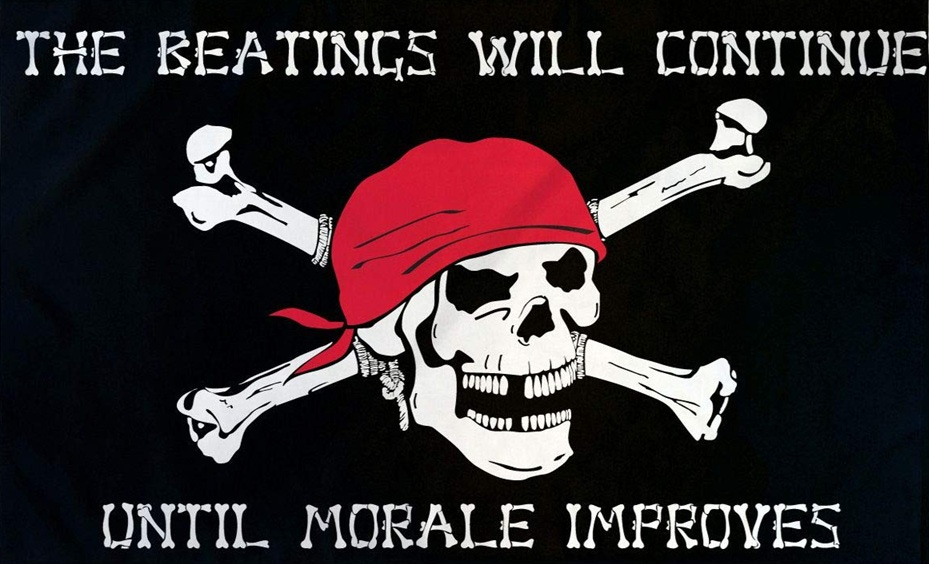
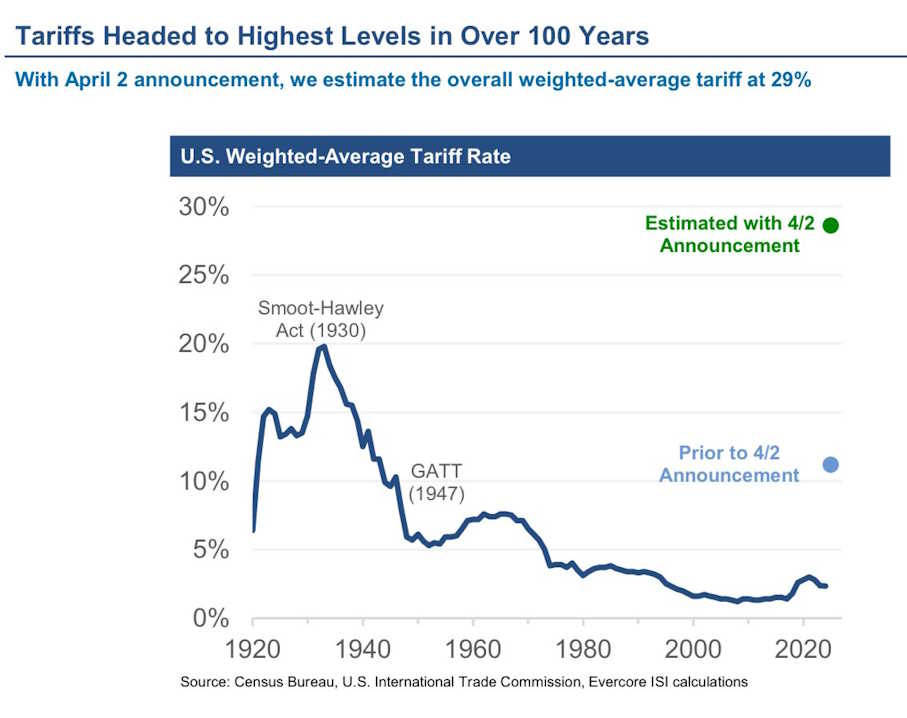
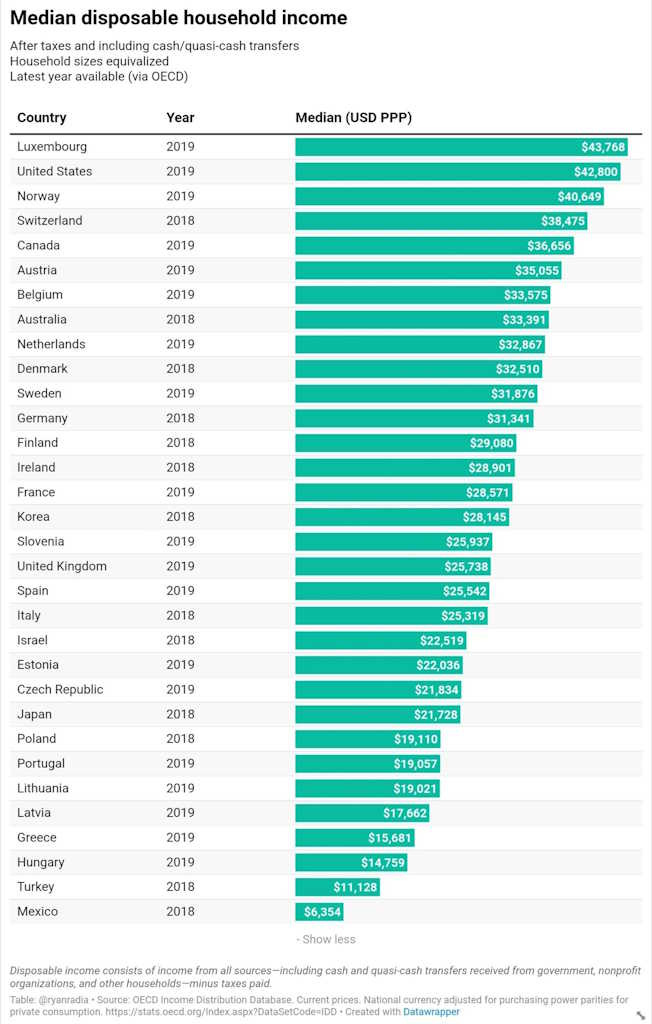
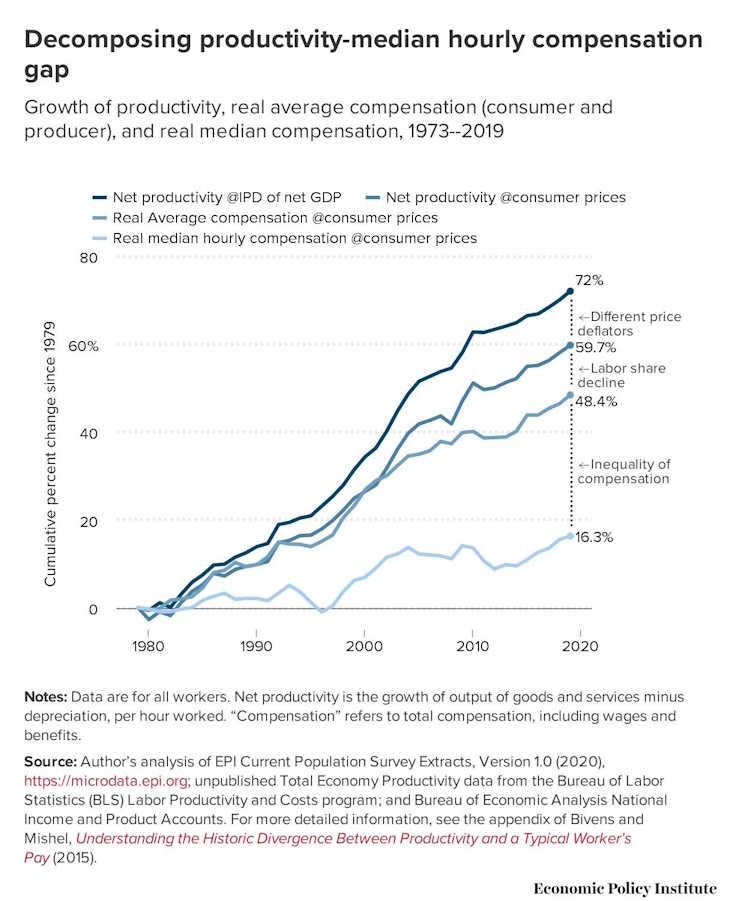
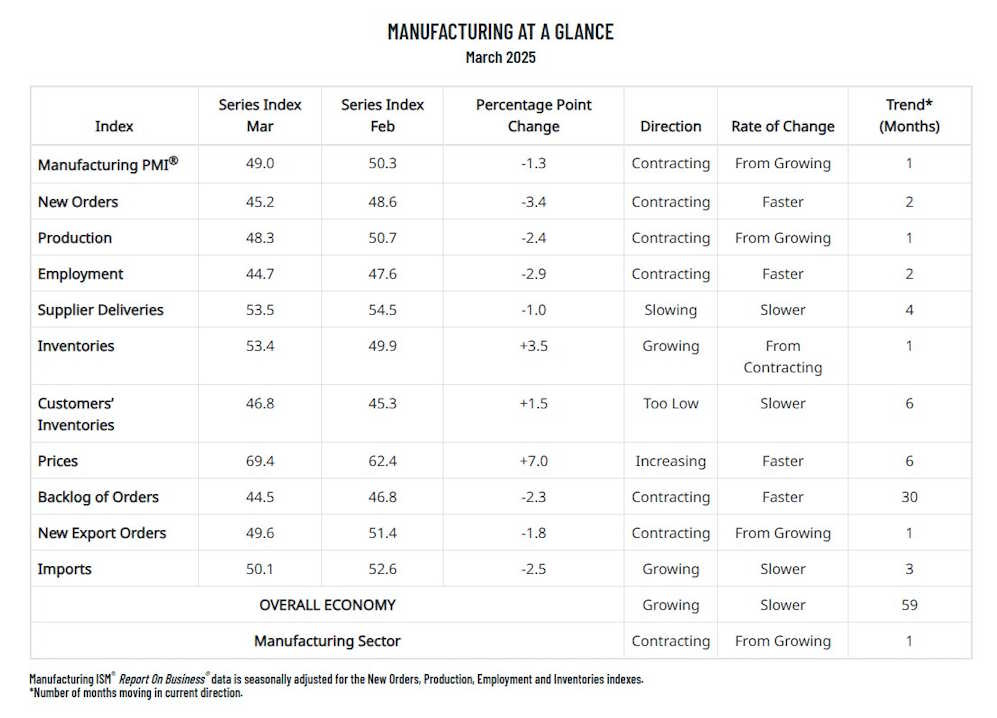
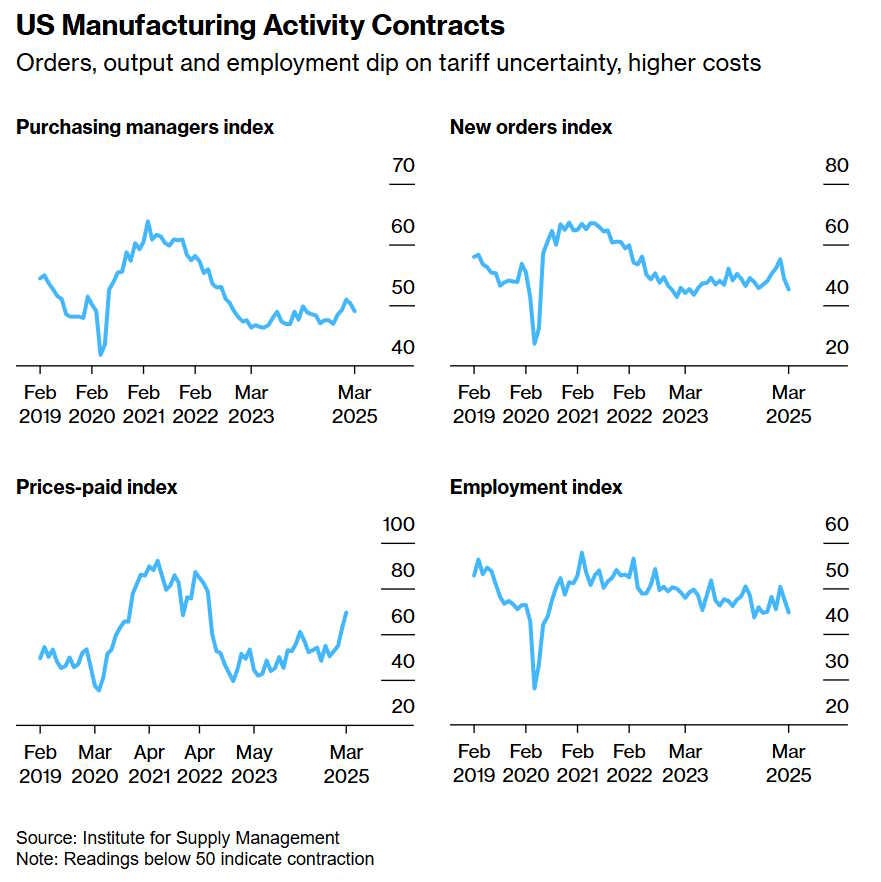
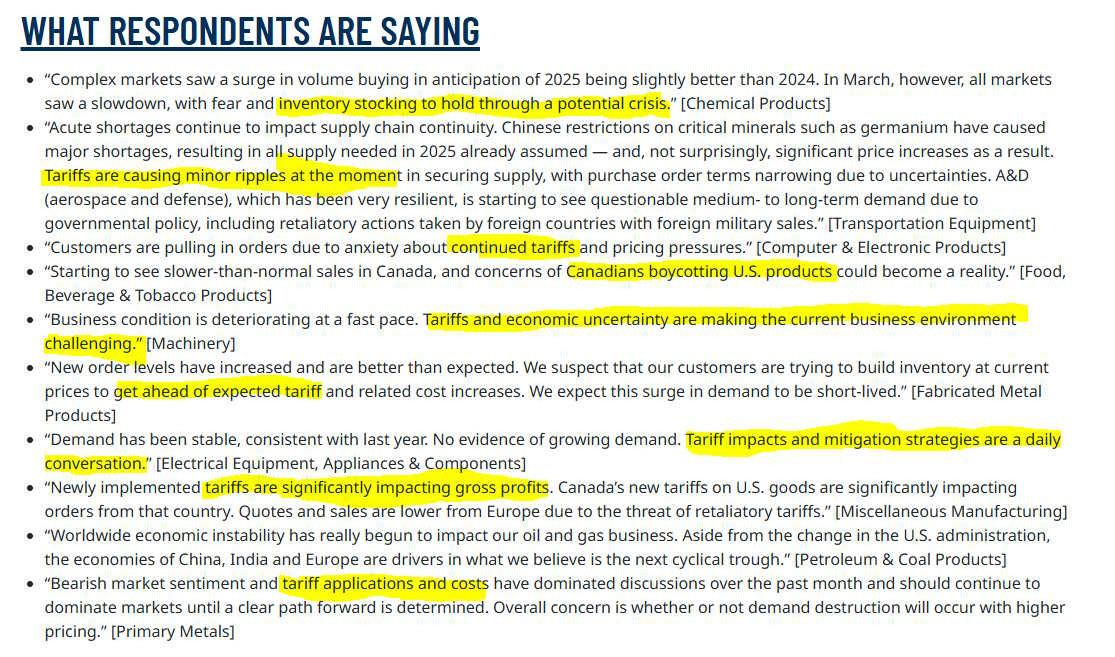
I know Smith is a very smart guy. He says some things here that raise my hackles.
That makes me reconsider the things that raise my hackles.
Reconsidering is good.
TLDNR........like always. Have you ever heard of the Reader's Digest version of a story? Try toning it down a bit, provide content, then the link. Those interested will read the rest
Alternatively, those who aren't interested enough to actually read a seed could... simply go away.
A critical point.
I'll say this, this author is actually more nuanced and even handed than most of the left wing purveyors of partisan pulp that we are subjected to. Smith seems to be the anti-Krugman, actually trying to do more than simply pander to the prejudices of his dim bulb progressive patrons.